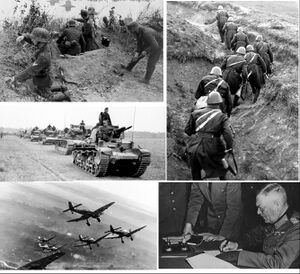Valduvian-Weranian War
| Valduvian-Weranian War | |||||||||
|---|---|---|---|---|---|---|---|---|---|
| Part of the Aftermath of the Great War | |||||||||
 (clockwise from top)
| |||||||||
| |||||||||
| Belligerents | |||||||||
|
Supported by |
Supported by Template:Country data Estmere | ||||||||
| Commanders and leaders | |||||||||
|
|
| ||||||||
| Strength | |||||||||
| 49 divisions | 56 divisions | ||||||||
| Casualties and losses | |||||||||
|
Approx. 19,350 killed 90,000+ captured |
About 35,000 killed 300,000+ captured | ||||||||
The Valduvian-Weranian War was an armed conflict between the Federated Valduvian Council Republics and the Weranian Confederation that took place from December 1949 to May 1950 when an armistice was signed, with the war being brought to an end with the Rayenne Treaty in July 1950.
In 1949, as the Weranian Empire in Coius went into collapse and the country became under the increasing control of right-wing, anti-socialist elements, there was growing suspicion that Valduvia was undermining the Weranian state and that a preventive war was necessary. Pan-Weranicism also underwent a small revival in Werania, whilst domestic troubles due to increasing right-wing and royalist terrorism in Valduvia led the Weranian government to conclude that a Weranian invasion of the country would be approved by the majority of the Valduvian population, particularly its Weranic speaking citizens.
In December 1949 the Bundeswehr launched a surprise attack on Valduvia, with panzer divisions crossing the border. The Weranian airforce also launched a raid in an attempt to destroy the Valduvian airforce; this ploy failed significantly handicapping Weranic planes. From December to February, the Weranian army made large advances into Valduvia primarily utilising blitzkrieg; by the beginning of February 1950 the Weranic army had occupied around a third of Valduvia and much of its northern industrial centres. A further advance under Operation Kingfisher led to a successful Valduvian counterattack, who through deep operation warfare that halted the Weranian advance at the Battle of Ühinemine. Valdunvian forces soon launched their own offensive that decimated Weranian forces and forced them into a retreat. After the battle of city which saw the Weranian Eastern Army Group encircled and destroyed in April, Werania's army rapidly lost ground and by May 1950 had been pushed back to the Justa river.
The destruction of a large section of the Weranian army and success of Valduvian forces led to neighbouring countries such as Estmere - whose relations with Valduvia were poor - to consider an intervention against Valduvia. A failed coup against the Weranian government led to a change in leadership and collapse of influence by hardliners in the government, replaced with politicians eager to conclude a peace with Valduvia. Despite having the capability to advance, Valduvian leaders worried of a coalition against their country entered an unexpected ceasefire with Werania over the Justa river and started peace talks through the Community of Nations.
The Etten Ceasefire saw the armistice border become the de facto one, with Valduvia gaining the wealthy industrial region of the Zingebirge Basin and Western Uschupes, whilst Werania gained the smaller region of the Acupis strip. The success of Valduvian forces confirmed it as the most powerful country in northern Euclea and emboldened socialists abroad. In Werania the de facto defeat of its armed forces and of the militarist factions in government led to the country to abandon its policy of attempting to position the Weranian Empire as a superpower and began a process of rapid decolonisation, whilst beginning to enter a period of integration into the Euclean Community. The war also started the development of nuclear weapons in both countries. The border was only finalised in 1998 with the signing of the Treaty of Gurantees between the two nations.